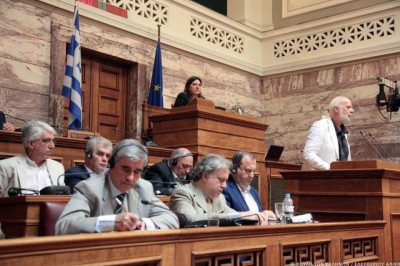The ECB Destabilized the Greek Economy to Subject Greece to Creditors’ Demands

Image: Éric Toussaint before the Greek Parliament on 17 June 2015, in the presence of Zoe Konstantopoulou, president of the Greek Parliament and several ministers
Éric Toussaint interviewed by Rosa Moussaoui, Special envoy in Athens for L’Humanité
Has Athens really been subjected to a financial coup d’état over recent weeks as claimed by many Greek and foreign observers?
Éric Toussaint: Yes and no. What was decisive was the result of political decisions made by political institutions, though obviously complicit with financial interests. The coup d’état was not directly led by financial powers, but by institutions, the European Commission and the heads of State and Government of the Eurozone. Germany was not the only country involved. Mariano Rajoy in Spain, or Pedro Passos Coelho in Portugal, not to mention the Finnish, Latvian and other decidedly neoliberal governments clearly wanted to demonstrate to their respective populations that the options presented to the European peoples by the Syriza government were unworkable. So the primary motivation was political. Clearly though the private banking sector and the multinational corporations also wanted to show that it is impossible to turn away from austerity policies. However, it must be remembered that Greece’s principal creditors are public institutions; since 2012 when they managed to unload their Greek debt, private banks are not the most interested party. The debt restructuring that took place permitted them to comfortably withdraw. Today, despite the failure of the economic policies that have been imposed on Greece, the European Commission, the ECB and the Eurozone countries are adamant that Greece continues on the path of neoliberalism. Remember that the IMF is also a political institution.
Alexis Tsipras expected assurances for debt relief in return for his capitulation to the austerity policies. The creditors have merely acquiesced to a discussion scheduled for this year on a possible debt restructuring starting from 2022. Why this obstinacy, while the IMF itself now considers the debt as unsustainable?
Éric Toussaint: I think that a Debt Restructuring is feasible before 2022. The creditors will say “not before 2022” because they know that this plan will not work and that the debt payment will be unsustainable. They will restructure this debt provided the neoliberal reforms are pursued. Debt is a means of blackmail, an instrument of domination. Basically, in the Greek case, the creditors are not so much motivated by profit, pertinent as it is, as by teaching a lesson to their own people and the peoples of other peripheral countries that there is no question of deviating from the model. For Hollande to say, “Look, even Tsipras and the radical left cannot escape the economic stranglehold!” is a way of vindicating his own abdication in 2012 on the promise to renegotiate the European treaty on fiscal stability.
Did Tsipras have any other choice vis- à-vis the violent attacks from the creditors? Does the alternative boil down to an exit from the Euro?
Éric Toussaint: I don’t think so. The choice was not necessarily between Grexit and remaining in the Euro Zone equipped with a new austerity plan and continuing to pay the debt. It was possible to stay in the Euro Zone by disobeying the creditors through legal means. Human rights violations are at stake here. The Greek authorities should have suspended the debt payment; retrieved control over the Bank of Greece (Antonis Samaras appointed its CEO, who has not served the interests of the country); and created a complementary electronic currency that could have helped to cope with the liquidity crisis, whilst remaining within the Euro Zone.
The State should also have taken the following steps:
1. Organize an orderly liquidation of banks and transfer the assets to the public sector (guaranteeing deposits up to € 100,000) whilst ensuring the protection of small shareholders and recovering the cost of cleansing the banks from the wealth of major international shareholders.
2. Reduce VAT on goods and basic utility services; reduce direct taxes on low income and assets; and levy heavy taxes on the income and wealth of the richest 10% (particularly the richest 1%).
3. Stop privatization and reinforce public services.
After the Greek Parliament adopted the disastrous agreement of 13 July, the prospect of a voluntary exit from the Euro is obvious. That there is no favourable solution for the peoples within the Euro Zone is now evident to more and more Greek and other European people. In case of a voluntary exit from the Euro Zone, the above propositions remain fully valid and a redistributive monetary reform must accompany them (see Greece: Alternatives to the Capitulation).
The ECB, one of the masterminds of the coup, is flooding the financial markets with liquidity and boosting speculation. Can capital generation serve the real economy, social needs and human development?
Eric Toussaint: Of course but this not what the ECB has been doing! Mario Draghi is not “independent”. He is the interface between major private banks and the governments of the Euro Zone. The ECB has deliberately destabilized the Greek economy to suit its own as well as other creditors’ purpose.
Translation : Suchandra de Sarkar, Mike Krolikowski and Christine Pagnoulle
See online : http://www.humanite.fr/eric-toussai…

